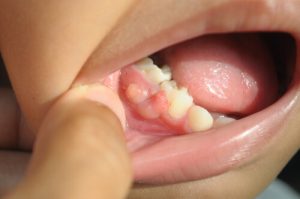Contents
Dealing with an infected ulcer in mouth can be a painful and distressing experience. This condition causes significant discomfort and raises concerns about underlying health issues. What exactly triggers an infected ulcer in the mouth, and how can it be effectively treated? Dive into this article to unveil the answers and learn how to manage this troublesome condition.
Understanding Infected Ulcer in the Mouth
Infected ulcers in the mouth, commonly called mouth ulcers, unlike cold sores or canker sores, are painful sores that can appear on the soft tissues inside the mouth, like the inner cheeks and tongue. These sores are distinct from cold sores, which are caused by viral infections and appear outside the mouth.
Distinct nature: Mouth ulcers, or canker sores, differ from cold sores or sores, appearing only inside the mouth and are not contagious.
Common types: Aphthous ulcers, also known as recurrent aphthous ulcers or stomatitis, are a frequent type, often triggered by various factors, including a weakened immune system and nutritional deficiencies such as folic acid.
Triggers and contributing factors: These include hormonal changes, accidental biting, certain foods like spicy or acidic fruits, and conditions such as celiac disease or Crohn’s disease.
Symptoms to watch for: These ulcers typically present as small sores or unusually large appear inside the mouth with ulcers that cause a burning sensation and are extremely painful.
Prevention and management: Strategies include maintaining a balanced diet, using a soft-bristled toothbrush, and avoiding foods that might trigger ulcers. Over-the-counter medications and mouth rinses containing sodium lauryl sulfate can also help reduce pain and facilitate healing.
When to see a doctor: If ulcers are intense, chronic, or accompanied by additional symptoms, it’s crucial to consult a healthcare provider, as they may be a sign of more serious conditions like mouth cancer or oral lichen planus.
Common Causes of Infected Mouth Ulcers
Infected mouth ulcers, often distressing and painful, arise from many factors. These sores, primarily found inside the mouth, significantly impact daily activities like eating and speaking.
Nutritional Deficiencies: Insufficiency of essential nutrients, especially vitamin B12, iron, and folic acid, often leads to mouth ulcers. These deficiencies impair the mouth’s ability to regenerate tissues and maintain healthy mucous membranes.
Stress and Hormonal Changes: Stress, whether emotional or physical and hormonal fluctuations frequently trigger mouth ulcers. These factors disrupt the body’s immune response, making the oral tissues more susceptible to ulcers.
Mechanical Trauma: Accidental biting, sharp tooth edges, or poor-fitting dental appliances can cause mechanical injuries leading to mouth ulcers. Repeated trauma in the same area often exacerbates the severity of the sores.
Certain Foods: Spicy foods, acidic fruits, and certain food additives can irritate the mucous membrane inside the mouth, triggering ulcer formation. Identifying and avoiding these irritants can help reduce the frequency of ulcers.
Underlying Health Conditions: Autoimmune diseases like Crohn’s disease and celiac disease can manifest as mouth ulcers. These conditions cause the body’s immune system to attack its tissues, including those in the mouth.
Medications and Chemicals: Certain medications, including non-steroidal anti-inflammatory drugs (NSAIDs), and chemicals in oral care products, such as sodium lauryl sulfate, can contribute to the formation of mouth ulcers.
Recognizing the Symptoms of an Infected Ulcer
Identifying the symptoms of an infected ulcer in the mouth early can be crucial for effective treatment and preventing further complications. These ulcers, commonly known as canker sores or aphthous ulcers, manifest signs that signal an infection. Recognizing these symptoms enables timely intervention.
Painful Sores: Significant pain is the most immediate symptom of an infected mouth ulcer. These ulcers typically produce a sharp, stinging, or burning sensation, especially when eating spicy or acidic foods.
Increased Redness and Swelling: Look for redness around the mouth or the ulcer, which indicates inflammation. The area may also swell and feel tender to the touch.
White or Yellow Coating: Infected ulcers often have a white or yellowish film on the surface, surrounded by a bright red halo. This appearance is typical of canker sores.
Pus Formation: In some cases, a yellow or white pus may be visible at the center of the ulcer, signaling a bacterial infection.
Fever and Fatigue: Systemic symptoms like low-grade fever and general fatigue can accompany severe or multiple mouth ulcers, reflecting the body’s response to infection.
Difficulty Eating and Speaking: Due to pain and discomfort, individuals may experience difficulties with eating, drinking, and speaking, which can affect nutrition and daily activities.
Identifying these symptoms quickly can accelerate treatment. This may shorten the infection’s length and lessen its intensity. Should symptoms continue or deteriorate, consulting a healthcare professional is crucial. This step helps exclude more severe issues such as mouth cancer or viral infections and ensures proper treatment.
Diagnosis and When to Seek Medical Attention
Timely and accurately diagnosing mouth ulcers is crucial for effective treatment, particularly when these ulcers become infected or recurrent. Understanding when to seek medical attention can prevent complications and maintain proper conditions.
Initial Assessment: Diagnosis typically begins with thoroughly examining the oral cavity to assess the ulcers’ appearance, number, and location. Medical history is also reviewed to identify underlying conditions or potential triggers such as dietary habits, recent illnesses, or stress levels.
Diagnostic Tests: If recurrent or severe mouth ulcers occur, further diagnostic tests may be necessary. These can include blood tests for vitamin deficiencies, anemia, or signs of systemic diabetes or celiac disease. A mouth-sore biopsy may sometimes be performed to rule out malignancies or specific infections.
When to Seek Medical Attention:
Persistent Ulcers: If ulcers do not heal within two weeks, consult a healthcare provider.
Increasing Pain or Size: A professional should evaluate ulcers that become more painful or grow in size.
Recurrent Ulcers: Frequent occurrences of mouth ulcers can be an alarm of an underlying health issue.
Accompanying Symptoms: Symptoms such as fever, severe pain, difficulty swallowing or speaking, or significant weight loss should prompt immediate medical attention.
Signs of Infection: The presence of pus, increased redness around the ulcers, or a spreading of the sore area indicates an infection that requires professional treatment.
Early intervention is crucial for managing and preventing most mouth ulcers more effectively. Seeking medical advice is crucial for preventing potential complications and treating any underlying conditions contributing to the problem. Regular dental check-ups and good oral hygiene can also aid in managing and decreasing the occurrence of mouth ulcers.
Treatment Options for Infected Mouth Ulcers
Effectively managing and treating infected mouth ulcers involves a mix of home remedies, over-the-counter drugs, and potentially prescription treatments. Here’s a comprehensive guide to the various treatment options available:
Home Remedies
- Salt Water Rinses: Rinsing the mouth with a saltwater solution can help disinfect the area and reduce swelling.
- Baking Soda Paste: Applying baking soda and water paste can neutralize acids that irritate the ulcer, promoting healing.
- Honey Application: Honey, recognized for its antibacterial qualities, can be directly applied to the ulcer to promote healing and lessen inflammation.
Over-the-Counter Treatments
- Oral Pain Relievers: Products containing benzocaine or lidocaine can temporarily relieve the pain of mouth ulcers.
- Medicated Mouth Rinses: Antimicrobial mouthwashes containing chlorhexidine or hydrogen peroxide can help reduce bacteria and prevent infection.
- Protective Pastes: Protective barriers, often available as pastes or gels, can be applied over the ulcer to shield it from irritation while eating or brushing your teeth.
Prescription Treatments
- Corticosteroid Creams: Topical steroids can reduce inflammation and speed up healing when applied directly to the ulcer.
- Antibiotics: If a bacterial infection is confirmed, a healthcare provider might prescribe antibiotics to eliminate the infection.
- Immunosuppressants: For ulcers caused by autoimmune disorders, doctors may prescribe medications that modulate the immune response.
Nutritional Supplements
- Vitamin and Mineral Supplements: Vitamin B12, iron, and folic acid can be beneficial, especially if the ulcers are linked to nutritional deficiencies.
Lifestyle Adjustments
- Avoid Irritants: Avoiding spicy foods, acidic fruits, and tobacco can help prevent further irritation of the ulcers.
- Stress Management: Since stress can trigger or worsen ulcers, techniques such as meditation, yoga, or therapy can help manage stress levels.
Starting treatment at the first sign of symptoms is important to prevent the ulcers from worsening. If over-the-counter options do not provide relief, or if the ulcers recur frequently or are unusually large, it is crucial to seek professional medical advice for a more targeted treatment approach. Regular follow-ups with a healthcare provider can ensure the treatment plan is effective and adjusted as necessary.
Preventive Measures to Avoid Future Infections
Preventing mouth ulcers and potential infections involves a combination of good oral hygiene practices, dietary adjustments, and lifestyle changes. Implementing these preventive measures can significantly reduce the occurrence of these painful sores and promote overall oral health.
Maintain Good Oral Hygiene
- Regular Brushing and Flossing: Brushing at least twice a day with a soft-bristled toothbrush and flossing daily helps remove food particles and bacteria, reducing the risk of ulcers.
- Use Non-Irritating Dental Products: Opt for toothpaste and mouthwashes free from sodium lauryl sulfate (SLS) and other harsh chemicals that can trigger ulcers.
Dietary Adjustments
- Avoid Trigger Foods: Avoid spicy foods, acidic fruits, and anything else you’ve noticed tends to trigger your ulcers.
- Increase Intake of Nutritious Foods: Incorporate foods rich in vitamins B, C, zinc, and iron to support mucous membrane health and immune function.
Manage Stress
- Stress Reduction Techniques: Engaging in activities like yoga, meditation, or regular exercise can help manage stress, a known trigger for mouth ulcers.
Monitor and Manage Health Conditions
- Regular Health Check-ups: Regular visits to your healthcare provider can help control underlying health conditions like vitamin deficiencies, hormonal imbalances, and autoimmune disorders.
Avoid Physical Trauma
- Be Mindful of Dental Appliances: Ensure that braces and other dental appliances are well-fitted and that any sharp edges are smoothed to prevent mechanical injuries to the mouth lining.
Quit Smoking and Limit Alcohol
- Avoid Tobacco and Reduce Alcohol Consumption: Both can irritate the lining of the mouth and exacerbate the risk of ulcers and infections.
Stay Hydrated
- Drink Plenty of Water: Keeping the mouth moist can help prevent dryness, which often contributes to ulcer formation.
Incorporating these preventive strategies into your daily routine can significantly reduce the likelihood of developing mouth ulcers and ensure a healthier oral environment. This proactive approach not only helps in preventing mouth ulcers but also contributes to your overall well-being.
In conclusion, dealing with an infected ulcer in the mouth can be challenging, but understanding its causes, symptoms, and treatments can make a significant difference. You can effectively manage and prevent this painful condition by seeking timely medical attention and following proper care guidelines. Stay informed and proactive to ensure your oral health remains in top shape.
References
Mouth ulcers – NHS
https://www.nhs.uk/conditions/mouth-ulcers/
Mouth ulcers – Better Health Channel
https://www.betterhealth.vic.gov.au/health/conditionsandtreatments/mouth-ulcers
Mouth Ulcers: Types, Causes & Treatment
https://my.clevelandclinic.org/health/diseases/21766-mouth-ulcer
Mouth sores and ulcers (canker sores) | healthdirect
https://www.healthdirect.gov.au/mouth-sores-and-ulcers
Mouth Ulcer: Causes, Symptoms, Diagnosis, and Treatment
https://www.healthline.com/health/mouth-ulcers




